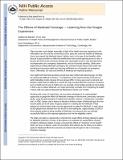The Effects of Medicaid Coverage — Learning from the Oregon Experiment
Author(s)
Baicker, Katherine; Finkelstein, Amy
DownloadFinkelstein_The effects of medicaid.pdf (26.19Kb)
OPEN_ACCESS_POLICY
Open Access Policy
Creative Commons Attribution-Noncommercial-Share Alike
Terms of use
Metadata
Show full item recordAbstract
There has been much debate, especially in light of the health insurance expansions in the Affordable Care Act and the current fiscal crisis, about the costs and benefits of Medicaid. Some have argued that Medicaid doesn't deliver much in the way of real benefits, either because it pays providers so little that beneficiaries have trouble gaining access to care, or because the low-income uninsured already have reasonable access to care through clinics, uncompensated care, emergency departments, and out-of-pocket spending. Others have argued that providing Medicaid coverage to the uninsured would reduce total health care spending by improving health and reducing inefficient use of hospitals and emergency rooms. Ultimately, the costs and benefits of Medicaid are empirical questions.
Description
available in PMC 2012 April 9.
Date issued
2011-08Department
Massachusetts Institute of Technology. Department of EconomicsJournal
New England Journal of Medicine
Publisher
New England Journal of Medicine
Citation
Baicker, Katherine, and Amy Finkelstein. “The Effects of Medicaid Coverage — Learning from the Oregon Experiment.” New England Journal of Medicine 365, no. 8 (August 25, 2011): 683-685.
Version: Author's final manuscript
ISSN
0028-4793
1533-4406